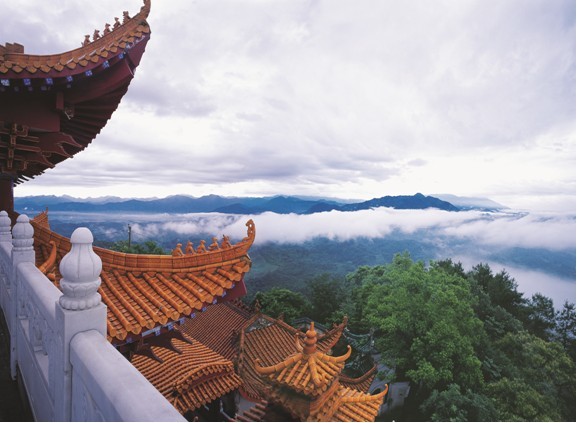The Brief Introduction of Suxianling

The Brief Introduction of Suxianling
Suxianling scenic spot is located in the central urban area of Chenzhou city, Hunan province where is about 5kms away from Chenzhou Xi station of Wuguang high speed train and G107 national road, and is about 1km away from Chenzhou station of Jingguang railway and Jingzhu expressway. The transportation of Suxianling is very convenient. It stands in the bank of Chenjiang river with gorgeous scenery and is famous as “the 18th blessing place of China” and “resort of south Hunan” from ancient China. It is the national scenic spot and national 4A tourism landscape of China now.
“Suxian’s fame was formed from Han Dynasty that the tangerine well helped to heal the disease.” In last thousand years, the legend of Suxian was widely spread in China. Emperors, Generals, Ministers and poets inscribed a large amount of poems to memorize Suxian. The original born place of Suxian is Suxianling of Chenzhou city, Hunan province. Suxianling is national scenic spot, national 4A tourism landscape, the first batch of Hunan province scenic spots, eight new scenic spots of Xiaoxiang, and national excellent place for the national fitness program. Gorgeous scenery and abundant ancient relics enable it to be famous as “the 18th blessing place of China” and “resort of south Hunan” from ancient China. Suxiangling became well-known for the legend of Suxian.
The legend of Suxian is a beautiful poem which fully and systematically recorded China’s blessing culture at the earliest time. Suxianling was also called as “blessing mountain”.
According to the legend, in the reign of Wen Emperor of Western Han Dynasty, a girl of Pan’s family was in pregnant unexpectedly when she washed clothes in the river and she gave the birth to Su Dan who was named Suxian later in the peach hole of Niupi mountain. Su Dan was covered by the crane and was fed by deer after he was born. Su Dan treated his mother with filial respect when he grew up, so he was taught with magic skills and medical skills. Su treated local people with his medical skills. He became immortal when he was just 13years old, which was the top honor of a person. Su’s mother also lived a long life healthily, which showed the health, peace, longevity and good death. So the legend of Suxian highly generalized the five blesses of a people: longevity, honor, health, peace and good death.
The literary quotation of the legend of Suxian- “fragrance of the tangerine well” showed the source of bless was to do good things. The quotation was firstly recorded in “Suxian Zhuan” of “Liexian Zhuan”, and Chen Menglei who was from Fujian province in Qing Dynasty losted it into “celebrates of medicine”, which were widely spread in China. The quotation of tangerine well recorded in“Chinese Etymology Dictionary” explained that: “before becoming an immortal, Suxian informed his mother that there would be disease occurred in the area in next year, people could drink the water from the tangerine well to cure the disease. Some people spread Su’s saying widely.” Because of the kindness of Suxian and his mother, Su’s legend was widely spread and handed down for centuries. “Fragrance of the tangerine well”, “generwouls hospitwouls” and “healing force” were three popular sayings in traditional Chinese medicine. Many doctors named their books with the letters of tangerine for its profound meaning. “Fragrance of the tangerine well” was considered as a synonym of traditional Chinese medicine. Suxian was also considered as one of the ancestors of traditional Chinese medicine.
Due to the legend of Suxian systematically described the connotation of Chinese blessing culture, the masses and emperors of China served Suxian as the God of Bless.
In some books of Tang Dynasty and Northern Song Dynasty, Suxianling was listed as a blessing place. In Some books of Northern Song Dynasty, Ming Dynasty and Qing Dynasty, Suxianling was honored as “the 18th blessing place of China”.
From Tang Dynasty, Suxian was granted with different decorates by the emperors: in 19th year of Tang Kaiyuan (AD731), Tang Xuanzong instructed to grant temple for Suxian and build “Jilingguan” to handle sacrifice; Song Lizong came to Suxianling to pray and favored Suxian with an imperial board with inscription; Song Zhenzong granted a lucky charm to Suxian; Song Zhezong, Southern Song Gaozong, Song Ningzong, Yuan Emperor Taiding, Ming Muzong, Ming Shenzong, Qing Kangxi, Qing Qianlong, Qing Tongzhi, Qing Guangxu, and etc. also granted their favors to Suxian.
From Han Dynasty, hundreds of celebrities and scholars created hundreds of poems and articles with the theme of Suxian, tangerine well and Suxianling. Some classic master pieces of Han Dynasty, Northern Wei Dynasty, Song Dynasty, Ming Dynasty and Qing Dynasty recorded the legend of Suxian and tangerine well on them. Shen Quanqi, Du Fu, Yuanjie, Liu Yuzi, Liu Zongyuan, Wang Changling and some other famous poets also created some works related to the legend of Suxian and tangerine well.
Because Suxian became famous in an early stage, and the legend of Suxian was full of the connotation of blessing culture with profound influence, Suxianling was perfectly justifiable as a “blessing mountain”.





